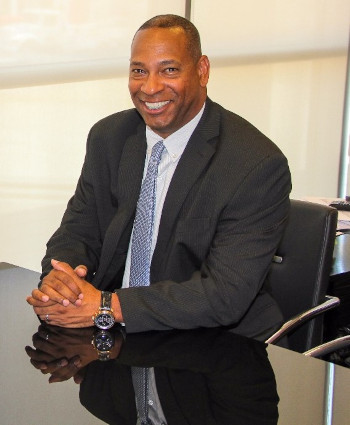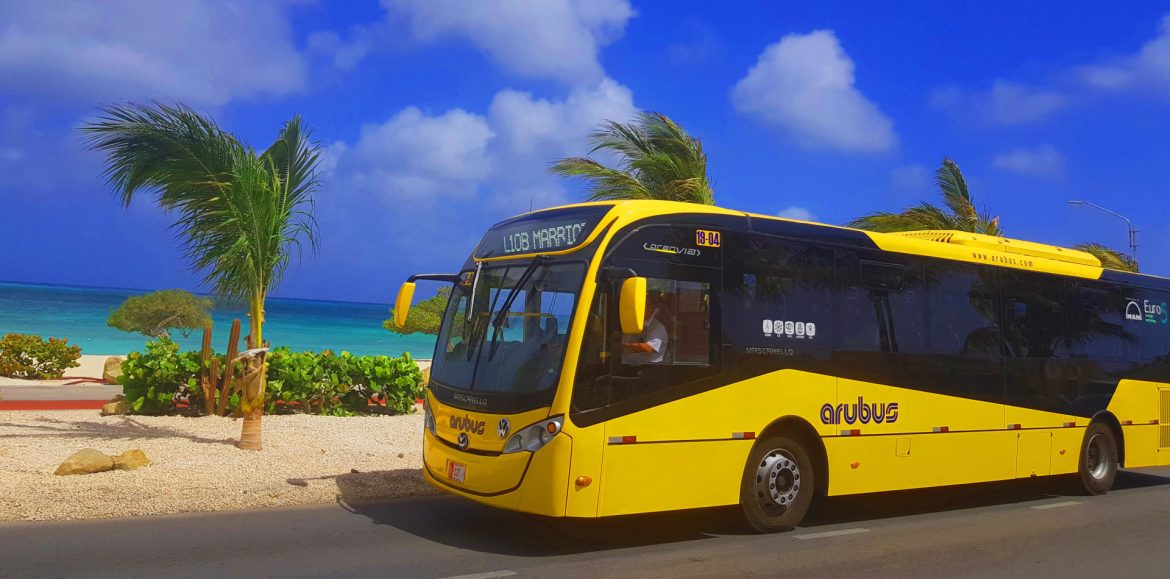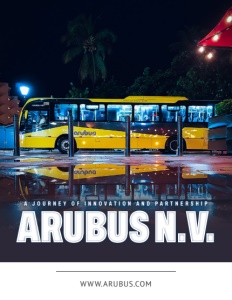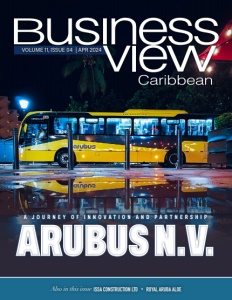Arubus N.V.
A Journey of Innovation and Partnership
Steering the course of public transportation in Aruba through technological advancements, strategic government collaborations, and a vision for sustainability.
Navigating the transportation journey ahead, Arubus N.V. is a pivotal player in the public transportation sector of Aruba, a gem of an island where the azure of the sea meets the warmth of its people. As a semi-private entity within the government, Arubus has been steering the mobility of the island’s populace for over four decades.

Edwin Mohamed, CEO
Edwin Mohamed, the CEO at the helm of Arubus N.V., paints a picture of an organization that is more than just a transportation service; it’s a lifeline. “Arubus N.V.,” he starts, “operates under the aegis of the government, with every share tightly held within its corridors. Given Aruba’s modest geography, the landscape of public transportation companies is equally limited. This scarcity underscores the significance of our mission.”
Going deeper into the operational nuances, Mohamed elucidates, “From inception, we’ve been the beneficiaries of governmental subsidies. These are not blank checks but are earmarked for specific services. Paramount among these is ferrying employees within the tourism industry, along with other passengers, at a reduced fare.”
The ethos behind this pricing strategy is simple yet profound. “The reduced fare doesn’t cover the trip costs,” Mohamed clarifies. “However, it’s a strategic move, underpinned by government subsidies, to ensure those with limited transportation options aren’t stranded. We’re here to bridge the gap, whether getting to work, school, or any other essential travel.”
Mohamed touches on the socio-economic fabric of Aruba and how Arubus N.V. is intricately woven into it. “Consider us the main public transportation artery,” he suggests. “In a small island nation where not everyone can afford personal transportation, our role transcends convenience. We’re a vital support system for the low-income segment, ensuring that mobility isn’t just a privilege for the few but a right accessible to all.”
Arubus N.V. During the Pandemic
As the world grappled with the unprecedented challenges of the COVID-19 pandemic, businesses across the globe were forced to adapt swiftly to survive. For Arubus N.V., a cornerstone in Aruba’s public transportation system, the pandemic posed a formidable test, impacting its operations and its role within the community. CEO Mohamed shares a candid look into the resilience and strategic shifts that enabled Arubus to navigate these turbulent times, maintaining its commitment to the community while reimagining its operational blueprint for the future.
“When the pandemic arrived, we were struck with a staggering 95% drop in our passenger numbers,” he recalls. The shutdown of borders and the halting of tourism—a lifeline for the island—resulted in a near-total collapse of ridership. “Hotels shuttered, shops closed, and our buses ran empty,” he continues, painting a grim picture of those initial weeks.
The government, however, accentuated the essential nature of Arubus’s service, particularly for those in the medical field. “There was a moment we considered halting our services,” Mohamed admits. “But the government insisted on continuing operations to ensure medical workers could reach their workplaces.” In response, Arubus pared its services to what Mohamed describes as a “skeleton schedule,” significantly reducing bus frequencies but keeping the wheels turning for critical healthcare transportation needs.
During this period of reduced operation, Arubus seized the opportunity to overhaul its schedule. “We were already revamping our schedule,” Mohamed explains, “and the pandemic presented a unique window to implement these changes thoroughly.” This strategic pivot became a reevaluation of how Arubus could serve its community more efficiently, even in adversity.
“Post-pandemic, we rolled out the new schedule we had crafted during those quieter months,” Mohamed shares. This wasn’t just a return to normalcy but a leap towards an improved service model, refined through the lessons learned during the pandemic’s peak.
Nevertheless, Mohamed clarifies that the fare structure remained unchanged. “We maintained our fare system throughout the pandemic,” he states, highlighting benefits such as reduced fares for card subscribers and free rides for seniors.
Strategic Flexibility of Routes and Schedules
In the wake of the pandemic, Arubus N.V. took decisive steps to reassess and redefine its routes and schedules to better serve the evolving needs of Aruba’s population and its economic pillars, including the critical tourism sector and educational facilities. This adaptive strategy was not merely a response to reduced ridership but a forward-looking approach to enhance service efficiency and meet the diverse needs of passengers, from schoolchildren to hotel employees and tourists.
“Our primary and most fruitful route is from San Nicholas to the hotel areas,” Mohamed begins, highlighting the lifeline of Aruba’s tourism sector. The pre-pandemic frequency of four to five buses per hour was recalibrated to three, a change aimed at optimizing occupancy rates and reducing operational losses. “This adjustment meant some passengers had to take an earlier bus, increasing occupancy rates from 80% to nearly 100%,” he explains. This strategic reduction ensured full buses and fostered a more sustainable model, balancing convenience against economic viability.
Mohamed further illustrates the company’s dynamic response to fluctuating tourist volumes. “There were days last year when we had five cruise ships docked simultaneously, bringing in up to 15,000 visitors,” he recounts. Arubus maintains a fleet on standby to accommodate such surges and is ready to deploy additional buses as needed. “This flexibility allows us to effectively manage the influx of tourists, ensuring we can provide service whenever and wherever it’s needed, especially in areas with high tourist concentration,” he affirms.
Turning to educational transport, Mohamed shares insights into Arubus’s specialized service for school routes. “Schools in Aruba start at 7:45 AM, necessitating early morning operations dedicated to schoolchildren,” he states, emphasizing the dual focus on security and affordability. Unique membership cards offer reduced fares, allowing flexibility for students with varying school hours. “Our service is twofold: dedicated school buses for standard school times and the option to use regular buses at reduced fares for off-schedule needs,” Mohamed details. This approach accommodates students’ schedules and integrates them into the broader public transportation network, providing a seamless and secure transit experience.

Embracing Innovation and Sustainability
In an era where technology and sustainability are not just trends but imperatives, Arubus N.V. is making significant strides under CEO Mohamed’s leadership. With a background in telecoms, he brought a fresh perspective to Arubus and steered the company towards modernization and environmental responsibility.
“Upon my arrival in 2019, I found Arubus at a technological standstill,” Mohamed shares, setting the stage for the transformative changes he initiated. The pandemic momentarily derailed these plans, but with resilience and strategic planning, Arubus has resumed its tech-forward trajectory. The imminent launch of a mobile application is a case in point. “We’re on the cusp of launching our app, which will revolutionize how passengers interact with our service,” Mohamed states. This app will allow passengers to track buses in real-time, receive updates, and manage their smart cards, fostering a more connected and informed user experience.
However, Mohamed acknowledges the smart card system’s limitations but is exploring innovative solutions to integrate digital fare payments without incurring prohibitive costs. “We’re taking baby steps towards digital integration, finding ways to circumvent the limitations of our outdated system,” he explains. This pragmatic approach balances ambition and financial reality to enhance service delivery within existing constraints.
The conversation shifts towards sustainability, a domain where Arubus is taking bold steps. Mohamed highlights a recent service-level agreement with the government to transition the bus fleet to electric by 2030. “This is a monumental shift, not just in our operations but our mindset,” he notes. The transition involves extensive planning, from retraining staff to installing charging stations and evaluating the performance of electric buses in Aruba’s unique environment.
Additionally, Arubus is advancing its sustainability efforts by constructing environmentally friendly bus stops that align with the LEED standard. “Even as a small player on a small island, we’re committed to making a significant environmental impact,” Mohamed asserts. This dual focus on cutting costs and reducing carbon emissions illustrates Arubus’s holistic approach to sustainability, viewing financial viability and environmental stewardship as complementary, not conflicting, goals.
Forging Ahead: Arubus’s Strategic Collaborations and Future Priorities
In the evolving landscape of public transportation on the sun-drenched isle of Aruba, Arubus N.V. is on a path of innovation and strategic partnerships under the stewardship of CEO Mohamed.
Mohamed starts by unambiguously crediting the government as Arubus’s cornerstone partner. “The government is our lifeline,” he asserts. This partnership goes beyond mere financial assistance; it’s a symbiotic relationship that sustains the essence of Arubus’s operations. “Without their support, we simply wouldn’t exist,” Mohamed adds, underscoring the government’s pivotal role in subsidizing the company and ensuring its services remain accessible to all layers of society. This alliance is not static; it evolves with the political landscape, yet its foundation remains unshakably supportive of Arubus’s mission.
Addressing collaborations beyond the government, Mohamed cites the company’s relationship with educational institutions and the hospitality sector. “Our engagement with schools is straightforward,” he explains. Schools, with their static nature, do not necessitate intricate coordination. The focus is monitoring enrollment trends to adjust service capacity accordingly, ensuring every student can access reliable transportation. “It’s a simple yet critical operation to guarantee that our younger generation reaches their educational destinations safely,” Mohamed remarks.
Conversely, the dialogue with the hotel industry appears nascent. “There’s potential for collaboration with the hospitality sector, but we’re not there yet,” Mohamed conveys, hinting at future opportunities to enhance tourist experiences through integrated transport solutions.
Looking to the future, Mohamed is candid about his priorities for Arubus. The imminent launch of a mobile application stands at the forefront of this journey. “This app isn’t just a tool; it’s a transformation,” he proclaims, envisioning a future where digital convenience aligns with user needs, offering real-time updates, digital fare transactions, and seamless travel planning. Beyond the app, Mohamed’s vision extends to digitizing the entire customer interface, from trip purchases to subscription management. “Digitalization is the beacon guiding our next steps,” he states, highlighting the dual goals of enhancing user experience and operational efficiency.
As Arubus navigates the challenges and opportunities of the present and future, its commitment to innovation, strategic partnerships, and sustainability shapes a journey marked by resilience and foresight. Under CEO Mohamed’s leadership, Arubus is not just responding to the evolving demands of public transportation; it’s actively crafting a future where mobility is efficient, accessible, and sustainable for all of Aruba’s residents and visitors.
AT A GLANCE
Arubus N.V.
What: The main public transportation provider in Aruba, committed to innovation, sustainability, and strategic partnerships to enhance service delivery.
Where: Aruba
Website: https://arubus.com/
PREFERRED VENDORS
Jahrubian Tours N.V. – romeanthony@live.com



